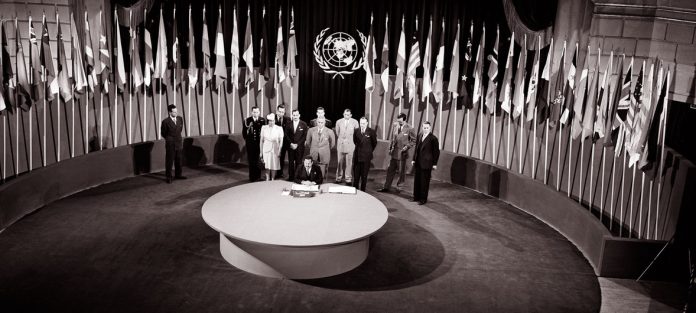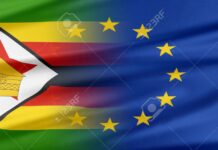The US-UN multilateralism and global monetary order: Implications for Southern Rhodesia’s monetary developments, 1950 – 1960
Tinashe Nyamunda
June 26, 2020 marked the 75th anniversary of the formation of the United Nations (UN) organization. Formed in 1945 with a specific mandate to prevent conflict on the scale of the two world wars, the organisation was founded on global multilateral-ism. Yet today, the 193-member country UN is facing serious challenges and is on the brink of a crisis, not least because the founding member countries, the United States of America, United Kingdom and the Soviet Union (present day Russia) have abandoned the multilateralism that formed the foundations of the organisation. Under the leadership of Donald Trump in the United States with his America first policy and Boris Johnson’s focus on Britain’s exit from the European Union (Brexit), the two most important super powers at the formation of the UN on 26 June 1945 have shifted more towards ultra-nationalist policies. From a monetary front, this is a crucial development with very fascinating implications for peripheral countries such as Zimbabwe as this article will demonstrate.
The formation of the UN marked an important turning point in global history, particularly in the context of the balance of global power as well as imperial-colonial relations. In the previous article, we examined the implications of the changes that took place in the aftermath of the Second World War. We discussed how the two world wars and a recession impacted negatively on the superpower status of the United Kingdom, triggering its gradual retreat from Empire, and the emergence of the United States up this role. But before getting into how these changes informed developments in the 1950s, particularly where Southern Rhodesia (colonial Zimbabwe) is concerned, lets briefly summarize how the USA utilized multilateralism to consolidate its position of global political and economic power, and then unpack the effect this would have on African countries in the 1950s.
In short, colonialism was not multilateral in nature. It was based on a few powerful European powers that conquered territories across the world and then pulled the political and economic strings. These powers, which included the UK, Germany, Spain, France, Portugal, Belgium, Italy all attempted, with varying degrees of success, to shape African colonies into what best benefited them. After securing colonial territories, these competing imperial powers assembled colonial institutions to help them govern and extract resources from these colonies in ways that best suited their monopolistic interests. For example, as has been emphasized in this column over the past weeks, the UK imposed its sterling system to ensure that it secured the balance of trade in its colonies as did the Portuguese with its escudo and the French with their franc, for example. While the use of currency was certainly quite fluid until 1945, the general occurrence was that imperial powers imposed their currencies to enforce economic compliance in their colonies as was the case with the use of sterling-based currencies in Southern Rhodesia. But the formation of the UN and its other wings such as the International Monetary Fund (IMF) and the World Bank (WB) in the mid-1940s would significantly shift the terrain.
The UN’s multilateral foundations were put in place to dismantle imperial monopolies. The rising political power of the United States allowed sufficient influence to shift the game in ways that allowed its control of international markets. If imperialism continued on the basis of European colonialism, then how would the USA access, not just sterling, escudo or Franc markets, but in what ways would its capitalists be able to extract primary resources under the guise of investment. Surely, the US dollar had to challenge imperial currencies and therefore qualify as crucial capital itself. By making the US dollar a global key currency, the US was well on its way to achieve this.
But as noted in the previous article, this could not be achieved simply by pushing off the UK’s colonial power and replacing sterling as a global key currency. This had to be done gradually for crucial geopolitical considerations. The US needed allies against the rising threat of communist Soviet Union, and the origins of the UK and the USA’s special relationship can be traced from this. This is why the British were allowed to consolidate their colonies for London’s economic recovery in the manner well discussed in the previous article.
Under the UK’s policy of consolidating its African colonies for economic recovery, the Federation of Rhodesia and Nyasaland was established in 1953. Although Roy Wellensky of Nyasaland and Godfrey Huggins of Southern Rhodesia had campaigned for it, the British realized that their hopes for economic recovery lay in expanded colonial markets which would help earn and save dollars under the mechanism of the UK’s discriminatory sterling area. But although Wellensky and Huggins wanted an amalgamation of the two Rhodesias’ the UK insisted that Nyasaland become part of the Federation’s white nation building experiment.
While it may appear contradictory that Britain was consolidating its colonies through Federation, not just in central Africa, but elsewhere in its Empire, the United States was laying the frontiers of global multilateralism, or globalisation as we know it today. Coinciding with the formation of the Federation of Rhodesia and Nyasaland in 1953, the United Nations assembled, under the leadership of Richard Stone (a Cambridge Professor), a team of academics to plan the ways in which the UN would operate. They came up with the economic pre-requisites for any aspiring member countries to join the UN. On top of the requirements for democracy and good governance, the economic pre-requisites were that the aspiring countries were to come up with a System of National Accounting (SNA), ostensibly designed to better manage their economies by measuring economic activities through such metrics as Gross Domestic Product (GDP), Gross National Product (GNP) among others. While statistically calculated in percentage terms, the monetary measure of these metrics was denominated in the ratio of US dollars a country held.
In other words, the moment that global exchange became anchored on the Bretton Woods system (specifically the US dollar), the die was cast and American multilateralism, well-founded. All that remained was to ensure that such institutions as the UN, the IMF and World Bank in which the USA had enormous influence established mechanisms to ensure that the rest of the world complied with its new order. The statistical advances leading up to the use of metrics such as GDP and GNP in National Income Accounting may have started in the 1920s, but they were given accelerated by the ascent of US multilateralism in the late 1940s and 1950s. Although double entry bookkeeping originated in Italy in the mid-1400s, its expansion and application for national income accounting across the world can be attributed to a number of economists who worked with people like Richard Stone. difference entre viagra et generique In central Africa, this work was pioneered by Audrey Richards’ work in Southern, and Northern Rhodesia in the late 1940s and 1950s.
But connected to these developments was the impression given by the USA that it would help emerging countries develop through loans and provision of aid, and the surest way was to utilize agencies such as the UN, IMF and World Bank. This partially explains the inclusion of the word ‘development’ in Harry Truman’s 1949 inauguration speech, leading to the emergence of a whole discipline of development economics in the 1950s, especially with the publication in 1954 of W.Arthur Lewis’ classic, Development with Unlimited Labour Supplies. To facilitate this development, the IMF and World Bank offered funds, not just for the rebuilding of post-war Europe, but also from the 1950s onwards the development of newly independent countries, denominated, of course, in US dollars. But what is the connection with Southern Rhodesia?
While Winston Churchill’s UK was still trying to resuscitate its Empire, the foundations of US dollar hegemony and global multilateralism were being laid down by people such as Richard Stone, among others. Even after the formation of the Federation, the colonies wanted US investment, something that created tensions within the empire. Even as Britain wanted US dollar earnings for its imperial coffers at the Bank of England, it also still wanted to recover its influential international position. This was demonstrated by London’s efforts to retain influence in its dying empire by creating the Commonwealth, a club for former British colonies.
But colonies were now clamoring for independence. In the Federation, the white population wanted dominion status like that enjoyed by South Africa, Canada, Australia and New Zealand. They even succeeded in arguing for the establishment of a central bank, something they had been denied since the early colonial period. However, even the central bank itself, I argue, was a glorified currency board as the Federation’s currency was still effectively sterling, being fully backed by it. But even in this set up, Africans mounted their own demands for majority rule, fighting against the limited franchise in which the minority white population had a majority claim to who was voted into political power. After all, white governments served white interests. The idea of racial partnership upon which Wellensky and Huggins had campaigned for Federation was proved untenable as Africans rose up against, not just the Federation, but colonialism in general and across the three territories.
Britain had begun to concede, parceling independence to Sudan by 1956 and Ghana by 1957, but elsewhere in its Empire, for example in Kenya, it resisted such demands from Africans. This is what led to the Mau Mau rebellion. It was only after this, and its embarrassing confrontation with Egypt in the 1956 Suez crisis that Britain realized it could no longer hold on to its colonies. Indeed, the Suez crisis resulted in the resignation of Prime Minister Anthony Eden only a year into his rule, after he had succeeded Winston Churchill who had been forced to resign because of old age. Succeeding Eden was Harold Mcmillan who would soon realize that Britain’s fortunes lay not in retaining its colonial empire but moving away from it. It lay in joining with Europe, which in response to US multilateralism, had decided to form the Organization of European Economic Coordination (OEEC), the precursor of the European Union. While Britain started applying for inclusion into this organization in the late 1950s, it was only admitted in 1972 after accepting the demands from France to relinquish its sterling area.
By the mid-1950s, it was clear that the world was becoming recalibrated in the form of the new American order in ways that had far reaching implications even in British colonies such as Southern Rhodesia. Even as the white settlers pursued autonomous white rule, they bought into this multilateral framework and the benefits it was perceived to bring. Development, especially the ways it was recast under Truman’s rule, would be funded by the US or multilateral funding agencies. For instance, in attempting to facilitate electrical development and expand copper production in Northern Rhodesia and boost industrial capacity in Southern Rhodesia, the Federation secured £120 million from the World Bank as well as some funds from the Colonial (later Commonwealth) Development Corporation (CDC). With these funds, the Kariba hydro-electric project was started in 1956 and completed in 1959. But even then, the major client for the resources that Kariba power was used to extract, copper from Northern Rhodesia, was the United States. The main market for Southern Rhodesia’s main export in the 1950s, tobacco, was London. Yet the development, through concessional loans of the hydro-power station was provided, again at a profit by Britain and the US.
By the late 1950s, the Federation had a central bank whose currency was still fully backed by sterling. But the critical difference between the 1950s and the preceding period was that the international economic terrain had shifted in the USA’s favour. As Britain began to retreat from empire, especially after the rise to power of Mcmillan in Britain after 1957, African independence movement began rising against Federation. Ultimately, the collapse of Federation came to be closely tied to the attainment of majority rule especially in Northern Rhodesia and Nyasaland. By the end of the 1950s, two commissions of inquiry investigated the feasibility of retaining the Federation but only concluded that it was best to dissolve it. But the world into which African postcolonial states would emerge was one which would be centered on US hegemony.
The British colonial world of the first half of the twentieth century began to unravel under the forces of post-Second World War US ascendancy. Although a number of factors explain Britain’s gradual retreat from its African Empire, US-led multilateralism and the discourse of development all precipitated what British Prime Minister, Harold Macmillan called the “winds of change” that were blowing across Africa. In other words, they resulted in increased struggle for liberation and majority rule. But as these African countries began fighting for their independence, they hoped that upon attaining their freedom, they would join the community of nations equally as independence states. Yet the dynamic would not allow for this. The new world order would be determined by US influence in UN globalism.
To join the community of nations as part of the UN, a country had to fulfil certain requirements. Among these included setting up nations based on the framework set in 1953 by Richard Stone and his colleagues, that of National Income Accounting metrics such as GDP. All of these would be based on US dollar valuation. What this simply meant was that the global south, if it adhered to these pre-requisites for joining the UN and therefore qualifying to access IMF World Bank funding to finance their development projects, had to pursue US dollar earning economic project so as to secure good balance of [predominantly US dollar] exchange to be considered successful. In this regard, many countries, like Sudan, abandoned the ideas of social transformation and social justice in pursuit of the US-informed notion of GDP development. Instead of transforming the economy, they simply entrenched US hegemony.
In all, the 1950s lay the foundation for the trading of European colonial imperialism for America’s imperialism of free trade. In the new National Income Accounting – based developmental order, the US began to secure the kind of imperial influence it required to take over control of peripheral economies. Southern Rhodesia had long sought autonomy from British sterling control and continued doing so in the 1950s, but to what extent would it manage to shake off British influence and secure a significant degree of monetary, financial, and economic autonomy. As Alden Young has shown in his book Transforming Sudan (published in 2018 by Cambridge University Press), the new breed of economic technocrats coming out of Sudan were educated in the ways of new American multi-lateralism and would impose this framework in the management of their economies. The next article examines to what extent local economic developments in Southern Rhodesia encountered these developments and the trajectory the colony’s monetary development ultimately took.
So, as we reflect on 75 years of the formation of the UN, we must consider the impact this organization has had on African economic development. Whose interests did it serve at its formation and how has that shaped the pursuit of decolonization on the continent? What are the lasting legacies of African nations association with the UN and its various organs? These are important questions to raise in a context where the UN does not seem to be the kind of organization that the bigger powers wish to continue sustaining as African countries demand increased participation in the organization. Does it still serve the needs of the superpowers such as the US, or has the rise of China caused a rethink of the continued usefulness of the organization in a context where they are trying to find other ways of preserving themselves, for example through Trump’s ultra-white nationalist discourses or Johnson’s Brexit administration. What implications have this had on money and the global south’s economy. Some of the questions will be examined in subsequent articles in this series.
- Tinashe Nyamunda is in the African Modernities Past and Present Research Group at North West University (South Africa) where he is Associate Professor of Economic History













Good question there, am also trying to dig it up now, “what are the lasting legacies of African nations associating with the UN??”
Very thought provoking!
Interesting article….. still getting more interesting…. well done
Thank you again for another interesting read. I think you have laid the foundation for political as well as financial history studies. You raise some important questions about economic policy in colonial Africa.